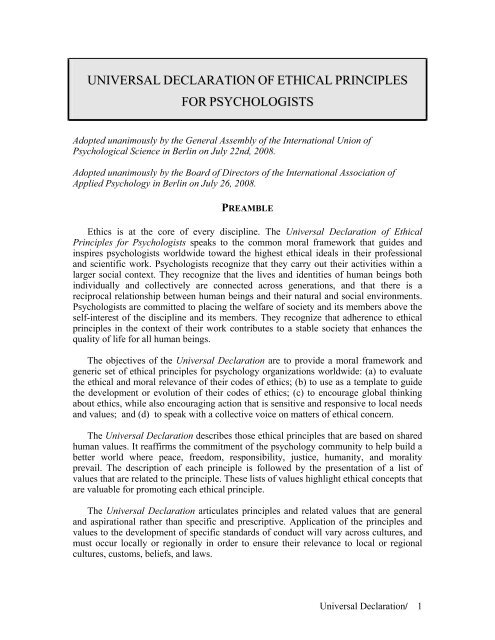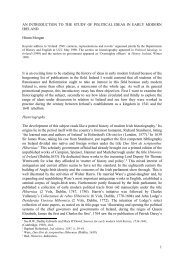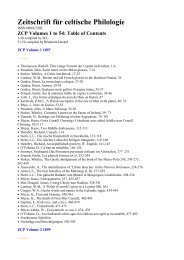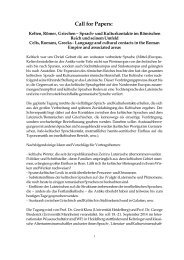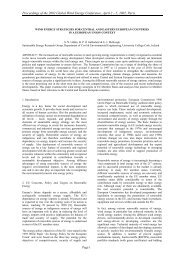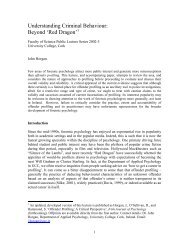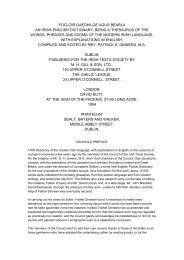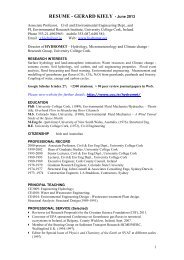universal declaration of ethical principles for psychologists
universal declaration of ethical principles for psychologists
universal declaration of ethical principles for psychologists
Create successful ePaper yourself
Turn your PDF publications into a flip-book with our unique Google optimized e-Paper software.
UNIVERSAL DECLARATION OF ETHICAL PRINCIPLES<br />
FOR PSYCHOLOGISTS<br />
Adopted unanimously by the General Assembly <strong>of</strong> the International Union <strong>of</strong><br />
Psychological Science in Berlin on July 22nd, 2008.<br />
Adopted unanimously by the Board <strong>of</strong> Directors <strong>of</strong> the International Association <strong>of</strong><br />
Applied Psychology in Berlin on July 26, 2008.<br />
PREAMBLE<br />
Ethics is at the core <strong>of</strong> every discipline. The Universal Declaration <strong>of</strong> Ethical<br />
Principles <strong>for</strong> Psychologists speaks to the common moral framework that guides and<br />
inspires <strong>psychologists</strong> worldwide toward the highest <strong>ethical</strong> ideals in their pr<strong>of</strong>essional<br />
and scientific work. Psychologists recognize that they carry out their activities within a<br />
larger social context. They recognize that the lives and identities <strong>of</strong> human beings both<br />
individually and collectively are connected across generations, and that there is a<br />
reciprocal relationship between human beings and their natural and social environments.<br />
Psychologists are committed to placing the welfare <strong>of</strong> society and its members above the<br />
self-interest <strong>of</strong> the discipline and its members. They recognize that adherence to <strong>ethical</strong><br />
<strong>principles</strong> in the context <strong>of</strong> their work contributes to a stable society that enhances the<br />
quality <strong>of</strong> life <strong>for</strong> all human beings.<br />
The objectives <strong>of</strong> the Universal Declaration are to provide a moral framework and<br />
generic set <strong>of</strong> <strong>ethical</strong> <strong>principles</strong> <strong>for</strong> psychology organizations worldwide: (a) to evaluate<br />
the <strong>ethical</strong> and moral relevance <strong>of</strong> their codes <strong>of</strong> ethics; (b) to use as a template to guide<br />
the development or evolution <strong>of</strong> their codes <strong>of</strong> ethics; (c) to encourage global thinking<br />
about ethics, while also encouraging action that is sensitive and responsive to local needs<br />
and values; and (d) to speak with a collective voice on matters <strong>of</strong> <strong>ethical</strong> concern.<br />
The Universal Declaration describes those <strong>ethical</strong> <strong>principles</strong> that are based on shared<br />
human values. It reaffirms the commitment <strong>of</strong> the psychology community to help build a<br />
better world where peace, freedom, responsibility, justice, humanity, and morality<br />
prevail. The description <strong>of</strong> each principle is followed by the presentation <strong>of</strong> a list <strong>of</strong><br />
values that are related to the principle. These lists <strong>of</strong> values highlight <strong>ethical</strong> concepts that<br />
are valuable <strong>for</strong> promoting each <strong>ethical</strong> principle.<br />
The Universal Declaration articulates <strong>principles</strong> and related values that are general<br />
and aspirational rather than specific and prescriptive. Application <strong>of</strong> the <strong>principles</strong> and<br />
values to the development <strong>of</strong> specific standards <strong>of</strong> conduct will vary across cultures, and<br />
must occur locally or regionally in order to ensure their relevance to local or regional<br />
cultures, customs, beliefs, and laws.<br />
Universal Declaration/ 1
The significance <strong>of</strong> the Universal Declaration depends on its recognition and<br />
promotion by psychology organizations at national, regional and international levels.<br />
Every psychology organization is encouraged to keep this Declaration in mind and,<br />
through teaching, education, and other measures to promote respect <strong>for</strong>, and observance<br />
<strong>of</strong>, the Declaration’s <strong>principles</strong> and related values in the various activities <strong>of</strong> its<br />
members.<br />
PRINCIPLE I<br />
Respect <strong>for</strong> the Dignity <strong>of</strong> Persons and Peoples<br />
Respect <strong>for</strong> the dignity <strong>of</strong> persons is the most fundamental and <strong>universal</strong>ly found<br />
<strong>ethical</strong> principle across geographical and cultural boundaries, and across pr<strong>of</strong>essional<br />
disciplines. It provides the philosophical foundation <strong>for</strong> many <strong>of</strong> the other <strong>ethical</strong><br />
<strong>principles</strong> put <strong>for</strong>ward by pr<strong>of</strong>essions. Respect <strong>for</strong> dignity recognizes the inherent worth<br />
<strong>of</strong> all human beings, regardless <strong>of</strong> perceived or real differences in social status, ethnic<br />
origin, gender, capacities, or other such characteristics. This inherent worth means that all<br />
human beings are worthy <strong>of</strong> equal moral consideration.<br />
All human beings, as well as being individuals, are interdependent social beings that<br />
are born into, live in, and are a part <strong>of</strong> the history and ongoing evolution <strong>of</strong> their peoples.<br />
The different cultures, ethnicities, religions, histories, social structures and other such<br />
characteristics <strong>of</strong> peoples are integral to the identity <strong>of</strong> their members and give meaning<br />
to their lives. The continuity <strong>of</strong> peoples and cultures over time connects the peoples <strong>of</strong><br />
today with the peoples <strong>of</strong> past generations and the need to nurture future generations. As<br />
such, respect <strong>for</strong> the dignity <strong>of</strong> persons includes moral consideration <strong>of</strong> and respect <strong>for</strong><br />
the dignity <strong>of</strong> peoples.<br />
Respect <strong>for</strong> the dignity <strong>of</strong> persons and peoples is expressed in different ways in<br />
different communities and cultures. It is important to acknowledge and respect such<br />
differences. On the other hand, it also is important that all communities and cultures<br />
adhere to moral values that respect and protect their members both as individual persons<br />
and as collective peoples.<br />
THEREFORE, <strong>psychologists</strong> accept as fundamental the Principle <strong>of</strong> Respect <strong>for</strong> the<br />
Dignity <strong>of</strong> Persons and Peoples. In so doing, they accept the following related values:<br />
a) respect <strong>for</strong> the unique worth and inherent dignity <strong>of</strong> all human beings;<br />
b) respect <strong>for</strong> the diversity among persons and peoples;<br />
c) respect <strong>for</strong> the customs and beliefs <strong>of</strong> cultures, to be limited only when a custom or a<br />
belief seriously contravenes the principle <strong>of</strong> respect <strong>for</strong> the dignity <strong>of</strong> persons or<br />
peoples or causes serious harm to their well-being;<br />
d) free and in<strong>for</strong>med consent, as culturally defined and relevant <strong>for</strong> individuals, families,<br />
groups, and communities;<br />
e) privacy <strong>for</strong> individuals, families, groups, and communities;<br />
f) protection <strong>of</strong> confidentiality <strong>of</strong> personal in<strong>for</strong>mation, as culturally defined and<br />
relevant <strong>for</strong> individuals, families, groups, and communities;<br />
g) fairness and justice in the treatment <strong>of</strong> persons and peoples.<br />
Universal Declaration/ 2
PRINCIPLE II<br />
Competent Caring <strong>for</strong> the Well-Being <strong>of</strong> Persons and Peoples<br />
Competent caring <strong>for</strong> the well-being <strong>of</strong> persons and peoples involves working <strong>for</strong><br />
their benefit and, above all, doing no harm. It includes maximizing benefits, minimizing<br />
potential harm, and <strong>of</strong>fsetting or correcting harm. Competent caring requires the<br />
application <strong>of</strong> knowledge and skills that are appropriate <strong>for</strong> the nature <strong>of</strong> a situation as<br />
well as the social and cultural context. It also requires the ability to establish<br />
interpersonal relationships that enhance potential benefits and reduce potential harm.<br />
Another requirement is adequate self-knowledge <strong>of</strong> how one's values, experiences,<br />
culture, and social context might influence one's actions and interpretations.<br />
THEREFORE, <strong>psychologists</strong> accept as fundamental the Principle <strong>of</strong> Competent Caring<br />
<strong>for</strong> the Well-Being <strong>of</strong> Persons and Peoples. In so doing, they accept the following related<br />
values:<br />
a) active concern <strong>for</strong> the well-being <strong>of</strong> individuals, families, groups, and communities;<br />
b) taking care to do no harm to individuals, families, groups, and communities;<br />
c) maximizing benefits and minimizing potential harm to individuals, families, groups,<br />
and communities;<br />
d) correcting or <strong>of</strong>fsetting harmful effects that have occurred as a result <strong>of</strong> their<br />
activities;<br />
e) developing and maintaining competence;<br />
f) self-knowledge regarding how their own values, attitudes, experiences, and social<br />
contexts influence their actions, interpretations, choices, and recommendations;<br />
g) respect <strong>for</strong> the ability <strong>of</strong> individuals, families, groups, and communities to make<br />
decisions <strong>for</strong> themselves and to care <strong>for</strong> themselves and each other.<br />
PRINCIPLE III<br />
Integrity<br />
Integrity is vital to the advancement <strong>of</strong> scientific knowledge and to the maintenance<br />
<strong>of</strong> public confidence in the discipline <strong>of</strong> psychology. Integrity is based on honesty, and on<br />
truthful, open and accurate communications. It includes recognizing, monitoring, and<br />
managing potential biases, multiple relationships, and other conflicts <strong>of</strong> interest that<br />
could result in harm and exploitation <strong>of</strong> persons or peoples.<br />
Complete openness and disclosure <strong>of</strong> in<strong>for</strong>mation must be balanced with other <strong>ethical</strong><br />
considerations, including the need to protect the safety or confidentiality <strong>of</strong> persons and<br />
peoples, and the need to respect cultural expectations.<br />
Cultural differences exist regarding appropriate pr<strong>of</strong>essional boundaries, multiple<br />
relationships, and conflicts <strong>of</strong> interest. However, regardless <strong>of</strong> such differences,<br />
monitoring and management are needed to ensure that self-interest does not interfere with<br />
acting in the best interests <strong>of</strong> persons and peoples.<br />
Universal Declaration/ 3
THEREFORE, <strong>psychologists</strong> accept as fundamental the Principle <strong>of</strong> Integrity. In so<br />
doing, they accept the following related values:<br />
a) honesty, and truthful, open and accurate communications;<br />
b) avoiding incomplete disclosure <strong>of</strong> in<strong>for</strong>mation unless complete disclosure is<br />
culturally inappropriate, or violates confidentiality, or carries the potential to do<br />
serious harm to individuals, families, groups, or communities;<br />
c) maximizing impartiality and minimizing biases;<br />
d) not exploiting persons or peoples <strong>for</strong> personal, pr<strong>of</strong>essional, or financial gain;<br />
e) avoiding conflicts <strong>of</strong> interest and declaring them when they cannot be avoided or are<br />
inappropriate to avoid.<br />
PRINCIPLE IV<br />
Pr<strong>of</strong>essional and Scientific Responsibilities to Society<br />
Psychology functions as a discipline within the context <strong>of</strong> human society. As a<br />
science and a pr<strong>of</strong>ession, it has responsibilities to society. These responsibilities include<br />
contributing to the knowledge about human behavior and to persons’ understanding <strong>of</strong><br />
themselves and others, and using such knowledge to improve the condition <strong>of</strong><br />
individuals, families, groups, communities, and society. They also include conducting its<br />
affairs within society in accordance with the highest <strong>ethical</strong> standards, and encouraging<br />
the development <strong>of</strong> social structures and policies that benefit all persons and peoples.<br />
Differences exist in the way these responsibilities are interpreted by <strong>psychologists</strong> in<br />
different cultures. However, they need to be considered in a way that is culturally<br />
appropriate and consistent with the <strong>ethical</strong> <strong>principles</strong> and related values <strong>of</strong> this<br />
Declaration.<br />
THEREFORE, <strong>psychologists</strong> accept as fundamental the Principle <strong>of</strong> Pr<strong>of</strong>essional and<br />
Scientific Responsibilities to Society. In so doing, they accept the following related<br />
values:<br />
a) the discipline’s responsibility to increase scientific and pr<strong>of</strong>essional knowledge in<br />
ways that allow the promotion <strong>of</strong> the well-being <strong>of</strong> society and all its members;<br />
b) the discipline’s responsibility to use psychological knowledge <strong>for</strong> beneficial purposes<br />
and to protect such knowledge from being misused, used incompetently, or made<br />
useless;<br />
c) the discipline’s responsibility to conduct its affairs in ways that are <strong>ethical</strong> and<br />
consistent with the promotion <strong>of</strong> the well-being <strong>of</strong> society and all its members;<br />
d) the discipline’s responsibility to promote the highest <strong>ethical</strong> ideals in the scientific,<br />
pr<strong>of</strong>essional and educational activities <strong>of</strong> its members;<br />
e) the discipline’s responsibility to adequately train its members in their <strong>ethical</strong><br />
responsibilities and required competencies;<br />
f) the discipline’s responsibility to develop its <strong>ethical</strong> awareness and sensitivity, and to<br />
be as self-correcting as possible.<br />
___________________________________<br />
Universal Declaration/ 4


